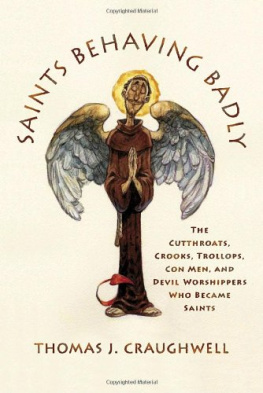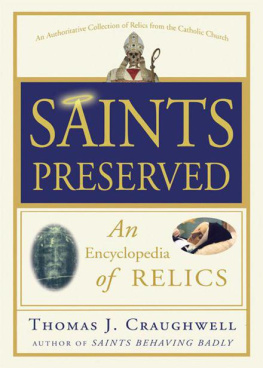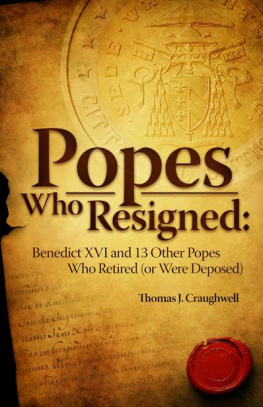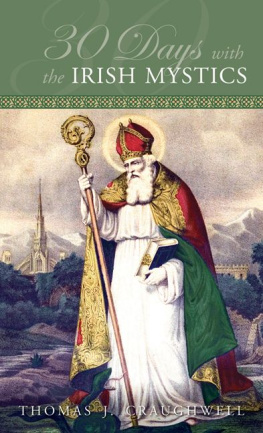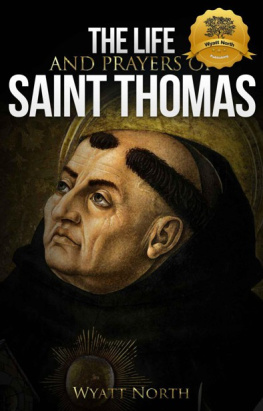Thomas J. Craughwell - This Saint Will Change Your Life
Here you can read online Thomas J. Craughwell - This Saint Will Change Your Life full text of the book (entire story) in english for free. Download pdf and epub, get meaning, cover and reviews about this ebook. year: 2011, publisher: Quirk Books, genre: Detective and thriller. Description of the work, (preface) as well as reviews are available. Best literature library LitArk.com created for fans of good reading and offers a wide selection of genres:
Romance novel
Science fiction
Adventure
Detective
Science
History
Home and family
Prose
Art
Politics
Computer
Non-fiction
Religion
Business
Children
Humor
Choose a favorite category and find really read worthwhile books. Enjoy immersion in the world of imagination, feel the emotions of the characters or learn something new for yourself, make an fascinating discovery.

- Book:This Saint Will Change Your Life
- Author:
- Publisher:Quirk Books
- Genre:
- Year:2011
- Rating:5 / 5
- Favourites:Add to favourites
- Your mark:
- 100
- 1
- 2
- 3
- 4
- 5
This Saint Will Change Your Life: summary, description and annotation
We offer to read an annotation, description, summary or preface (depends on what the author of the book "This Saint Will Change Your Life" wrote himself). If you haven't found the necessary information about the book — write in the comments, we will try to find it.
This Saint Will Change Your Life — read online for free the complete book (whole text) full work
Below is the text of the book, divided by pages. System saving the place of the last page read, allows you to conveniently read the book "This Saint Will Change Your Life" online for free, without having to search again every time where you left off. Put a bookmark, and you can go to the page where you finished reading at any time.
Font size:
Interval:
Bookmark:
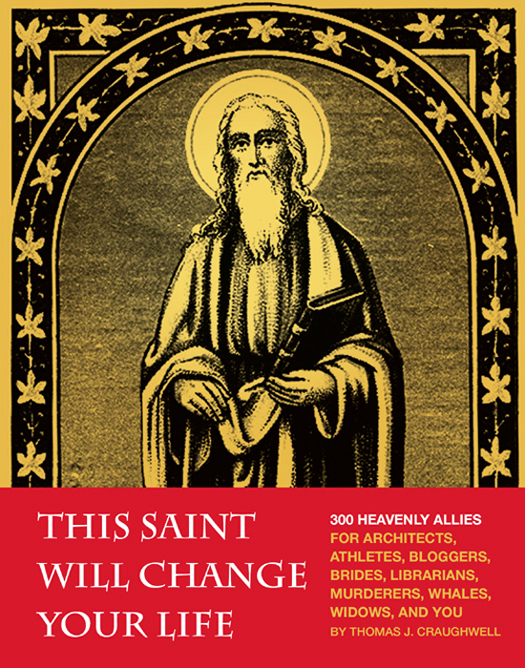

Copyright 2007 by Thomas J. Craughwell
All rights reserved. No part of this book may be reproduced in any form without written permission from the publisher.
Library of Congress Cataloging in Publication Number: 2007929460
eISBN: 978-1-59474-534-8
e-book production management by Melissa Jacobson
Image credits: , egg tempera on panel, Theodoros Pulakis (fl. 1650). Benaki Museum, Athens, Greece/The Bridgeman Art Library.
Quirk Books
215 Church Street
Philadelphia, PA 19106
quirkbooks.com
v3.1
T his life is a valley of tears. Success eludes us in our chosen careers. Our families, love life, and friendships are disappointing. We suffer from headaches, stomach trouble, and the occasional hangover. We fall prey to con men and make easy marks for panhandlers. We are afraid of snakes. We are dumb in science. We are bad dancers.
We can sit quietly in our homes and offices, seething with dissatisfaction, or we can seek help. And help is not only at hand, its free. Im talking about patron saints. A few years back, the blockbuster best seller The Prayer of Jabez assured us that its perfectly fine to pray for money. Yet why limit yourself to praying for relief from financial worries when heaven is just teeming with men, women, and children (not to mention angels) who are readyeager, evento weigh in and solve just about every problem that afflicts the human race. All we have to do is ask.
For example, did you know there are patron saints for gamblers and alcoholics; for thieves, card sharps, and fallen women; for wives saddled with unfaithful husbands and parents stuck with disappointing children?
There are patron saints for bartenders, diplomats, and conscientious objectors; for vegetarians and eco-warriors; for coin collectors and rock climbers. There are saints to protect you from the devil, from witches, and from being hanged; saints to shield you from an attack of appendicitis and to nurse you through bowel disorders; saints to ward off poverty, encourage discretion, and put a stop to riots.
The Internet has a patron saint. Television does, too. And lets not forget the animal kingdom. Cats, dogs, and birds all have patron saints, as do cattle, pigs, horses, whales, wolves, and even salmon.
This religious phenomenon is extraordinary, but its origins are entirely secular. In ancient Rome, there were patrons and there were clients. Patrons were wealthy, powerful, influential individuals from the upper class who, in a spirit of noblesse oblige, gathered around them a small circle of clients. These clients were Romans who tended to be short on cash and light on luck. Every morning, as a sign of respect, the clients made a brief call at their patrons house. If the client had any petition to presentperhaps he was looking for a government job or he needed protection from creditors or he hadnt the money for his sons tuitionhe would turn to his patron for help, and the patron would solve the problem.
The Roman patron-client relationship became the model for the relationship of affection and confidence that exists between Christians and their patron saints. For about the first one thousand years of the Catholic Churchs history, a Christians patron saint mirrored the old Roman system: whichever saint answered a Christians prayers became his or her patron saint. In the early Middle Ages, the notion surrounding patron saints shifted, and certain saints came to be regarded as specializing in particular causes. By the sixteenth century, the era of the Protestant Reformation and the Catholic Counter-Reformation, patron saints had proliferated to such an extent that scarcely an ailment, animal, profession, or condition of life didnt have its very own patron saint.
The enthusiasm for patron saints survives today. Open the classified section of any newspaper and youll encounter column upon column of thank-you notices to St. Jude, the patron saint of impossible situations. Religious-goods stores thrive selling small plastic statues of St. Joseph, who, among his many other attributes, has become the patron saint of successful real-estate transactions. And with patron saints for astronauts, ecology, and AIDS, its obvious that this ancient devotion is keeping up with the times.
FIRST CENTURY FEAST DAY: SEPTEMBER 21
D uring the Roman Empire, tax collecting was one of the most lucrative jobs a person could have. With the emperors tacit approval, collectors were free to wring all they could from their districts taxpayers and then keep a portion of the proceeds for themselves. Caesar didnt mind the profiteering as long as the total assessed tax was delivered to his treasury. But Jewish taxpayers forced to pay the exorbitant sums werent quite so forgiving, especially when the tax collector was a fellow Jew, like Matthew. Jewish tax collectors were regarded as loathsome collaborators and extortionists who exploited their own people. Its little wonder, then, that in the gospels tax collectors are placed on par with harlots, thieves, and other shameless public sinners.
Matthew collected taxes in Capernaum, a town in the northern province of Galilee and the site of a Roman garrison. Christ was a frequent visitor there, performing such miracles as healing the centurions servant, curing Peters ailing mother-in-law, and raising Jairuss daughter from the dead. One day, while passing the customs house where Matthew was busy squeezing extra shekels from his neighbors, Christ paused to say, Follow me. That was all it took to touch Matthews heart. He walked out of the customs house forever, giving up his life as a cheat to become an apostle, the author of a gospel, and eventually a martyr.
As a tax collector, St. Matthew had to be good with figures. Consequently, accountants, bankers, stockbrokers, finance professionals, and, of course, tax collectors have adopted him as the saint they call on to help them advance in their profession.
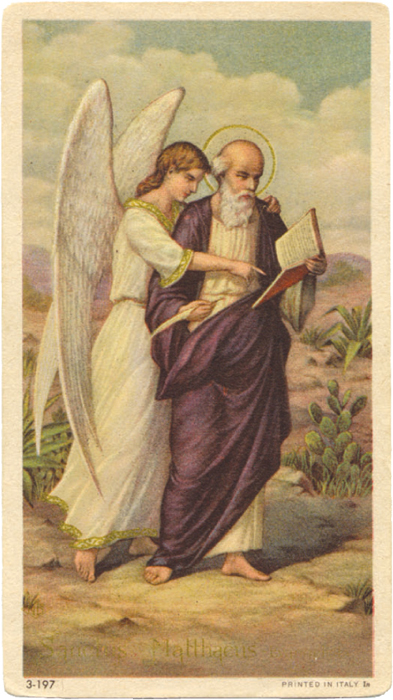
Accountants St. Matthew
18151888 FEAST DAY: JANUARY 31
J ohn Bosco, the youngest son of a peasant family near Turin, in northern Italy, was a bright, athletic boy with an engaging personality. One day when John was about ten years old, a small traveling circus pitched its tent near the familys farm. After just one performance John was mesmerized. He spent all his spare time with the jugglers and acrobats, who taught him a few tricks and then, when he proved he had talent, revealed their more sophisticated techniques.
After the circus moved on, John Bosco put on his own show for his family, juggling, using simple sleight of hand, and walking a tightrope strung between trees. Once hed polished his act, he invited some of the tough neighborhood kids to watch. They liked Johns one-man circus act and his down-to-earth personality. As they became friends, John found opportunities to suggest that the boys should watch their language, stay away from liquor, go to confession, and attend Mass. That was the start of John Boscos vocation to rebuild the lives of troubled kids.
As a priest, Don Bosco dedicated his life to reclaiming orphaned and abandoned boys. (In Italy, priests are addressed as Don rather than Father.) He built complexes in which the boys could grow up in a safe environment, receive an education, learn a trade, and even train for the priesthood.
Font size:
Interval:
Bookmark:
Similar books «This Saint Will Change Your Life»
Look at similar books to This Saint Will Change Your Life. We have selected literature similar in name and meaning in the hope of providing readers with more options to find new, interesting, not yet read works.
Discussion, reviews of the book This Saint Will Change Your Life and just readers' own opinions. Leave your comments, write what you think about the work, its meaning or the main characters. Specify what exactly you liked and what you didn't like, and why you think so.


